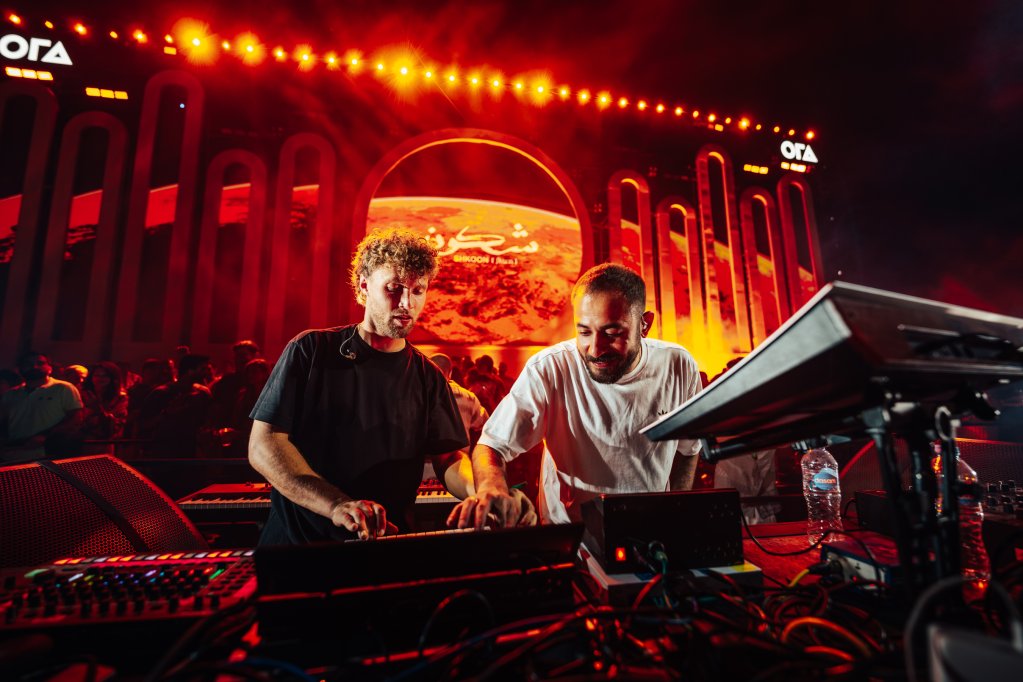Ameen Khayer, half of the duo that makes up the group Shkoon, says the group aims to break traditional frameworks in music and shatter stereotypes on refugees.
Ameen Khayer fled Syria amid the civil war in 2015. After a short stay in Turkey, he arrived in Hamburg, Germany. It was there that he met the German national Thorben Diekmann. An instant friendship, a spontaneous jam session in a kitchen, and the band Shkoon was born.
The duo’s music combines Arabic folk sounds with Western electronica, and a single concert often attracts hundreds or thousands of fans. The title of their "Greater Than One" tour is a nod to this international huge success, which comes from an affiliation that cuts across politically defined borders and speaks to a shared humanity.
Ameen Khayer spoke to InfoMigrants about his journey from the banks of the Euphrates in Deir Azzor, Syria to the branching Elbe River of Hamburg, Germany, and the impact he hopes his music can have.
InfoMigrants: What inspired your latest release "Jadal", which translates to "dispute"?
Ameen Khayer: The inspiration for "Jadal" comes from what is happening around us, and from my daily life. Like in any relationship, there is conflict. It reflects what we are feeling, like when the regime in Syria fell, making me question whether to go back or stay.
I was happy the dictator [Bashar al-Assad] left, because people can finally breathe. I cannot judge the new situation but I have doubts. I don’t have a clear view because I don’t live there anymore. I would love to go back, see my mother, and see my father’s grave -- I never got to bury him.
Read AlsoAfter Assad's fall, over 300,000 Syrians return home
How did you begin as a musician?
I left Syria because of the civil war. I was hoping to continue my studies in marine engineering in Turkey but it didn’t work out. I ended up in Hamburg, Germany. When I arrived, I was staying in a big exhibition hall with thousands of other people. [A record 1.3 million migrants applied for asylum in the European Union in 2015, with about half of them tracing their origins to three countries: Syria, Afghanistan, Iraq, editor’s note]. I was later moved to a container camp.
One day, I crashed at the place where Thorben was living. He said, “hey dude, let’s chill”. We were relaxing and singing in the kitchen, with his partner. Thorben told me afterwards that I had a beautiful voice. He was playing at some small concerts at the time, and I joined him. Our first big festival was Fusion 2016.

How can music help counter stereotypes on refugees?
That’s the whole idea of this project. As a refugee, people are always looking at you and putting you in a box. I don’t want to be a refugee, I want to be Ameen. This putting a label on someone is reducing them into something less than what they are. I’m a human being before anything.
If you watch the news in Germany, it often depicts refugees in the worst way: the immigrant who drove a car into a crowd, the immigrant who stole something, etc. I’m a brown guy with a beard and sometimes people on a train won’t sit next to me. The news in German politics is also worrisome, with certain leaders calling for remigration. I live in Berlin, but if you go to certain small cities, you feel like an outsider.
Even if one day we have the best government in the world in Syria, I will still keep talking about these issues, because a lot of people are still affected by racism and stereotypes. Our music also addresses losing home, being away from home, being confused.
Read AlsoFrance: Exhibition shines a light on human migration
How do you and Thorben manage to combine eastern and western musical traditions with such ease?
Thorben has a good feel for other cultures and music. He is the guy with the music theory, while I apply my emotions to the songs. I never studied music, I just translated my feelings into musical notes. I don’t come from an artistic background but my father used to draw, he was a painter.
When I met Thorben, everything happened naturally. He studied piano for eight years, so if I play two chords, he can extend it. A song usually begins with my vocals, then we listen together. Next, we add some percussion and make a mix out of it.
I’ve been going through a beautiful experience in my life lately. So I use keywords, and then try to extend them to make the words rhyme.
Could you imagine yourself playing in a concert in Syria one day?
I would love to if there were no strict rules on music and art. [The Islamism of Syria's new rulers has led to fears that culture may be in jeopardy, editor’s note] I’m waiting for a baby at the end of April so I don’t want to risk it. I’m also waiting for my German citizenship so I can maybe return to Syria one day.
We just completed the winter “Greater Than One” tour, and there will be a summer tour coming soon. We named the series of concerts this way because mathematically, the number one is not much. Two people are greater than one. With me and Thorben and the audience, we will always be greater than one.
